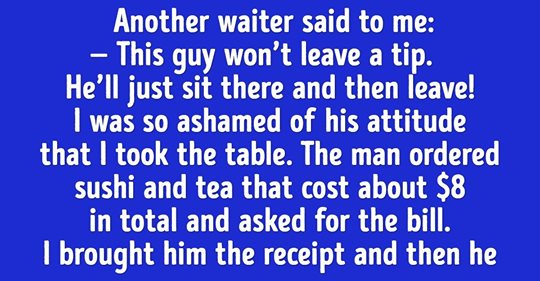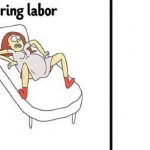A person demonstrates their good manners, or lack thereof, with their attitude toward their waiter. And you can expect anything from people who go into a restaurant and already think that they’re the most important one there. Waiters have learned to spot customers who may cause problems and serve their tables without much personal involvement.
We at Gain Tip decided to ask waiters about which details they pay attention to when they serve their customers and we want to share these curious observations with you. As a bonus, we’d like to reveal how you can become a loved and always-welcomed guest.
1. Whether the customer greets the staff
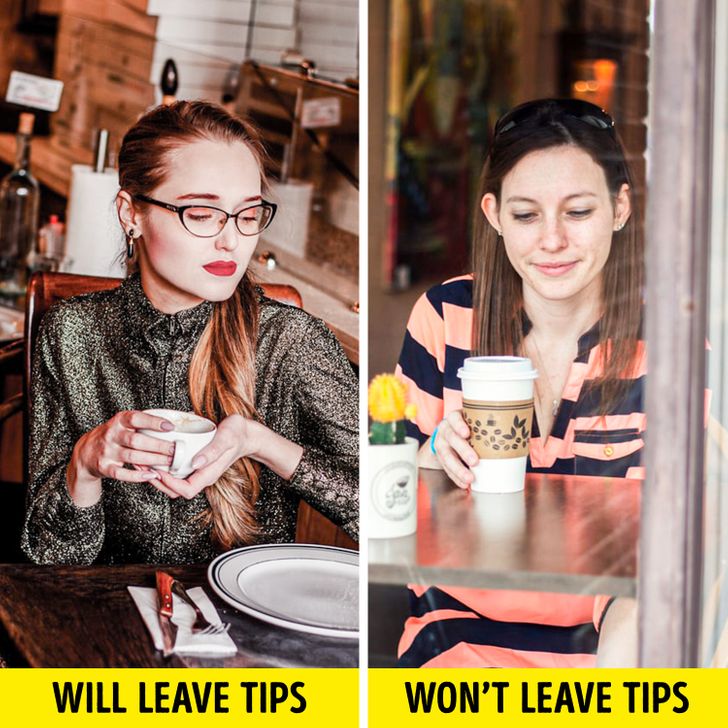
© Evgeniya Visochkina / unsplash, © Jacob Townsend / unsplash
All people who have ever worked as waiters are sure about one thing: if a person enters a restaurant with a poker face and doesn’t bother to say hello, they won’t have a good attitude, let alone leave a good tip.
We noticed a certain pattern: if a guest comes in and you greet them, but they don’t reply to you, then they’ll probably leave no tip. They usually just sit down at a table, order food, and sometimes they don’t even say, “thank you.” Then there are people who are too polite, who just shower you with compliments for everything you do. You come to their table, they greet you. You bring them their dish, change an ashtray, or say goodbye when they’re leaving, they say, “thank you.” But then you check the folder with the bill and see only coins. It looks like these customers are trying to pay you with their compliments. © shmealeks / Pikabu
I don’t like guests who don’t want to communicate. When they’re placing their order, it sounds like: “Just bring me some food.” And when you ask them for more detail, they won’t answer and just insist on you bringing them something. So I bring them the dishes I’d order myself and the conversation goes like: “But I wanted a different kind of drink” or “But I wanted a salad with seafood” or “But I like mutton more”… © Kiwi / Pikabu
2. Whether the customer comes alone or with their friends
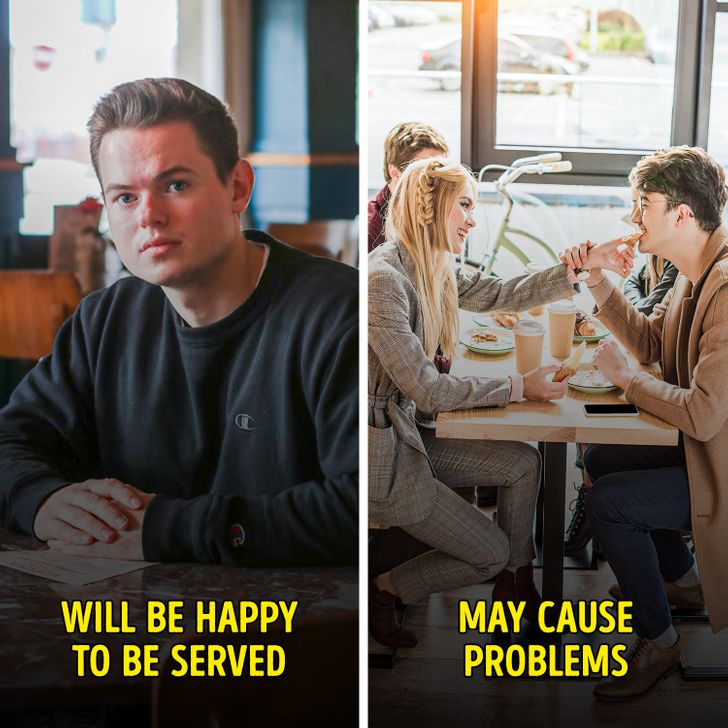
© Ryan Plomp / unsplash, © VitalikRadko / depositphotos
Waiters are sure that bigger parties can bring more problems because warmed-up guests often want to show off in front of their friends. A larger group also usually means that each guest will order something separately, instead of coming up with one big order. And they often leave a small tip. This happens because a person feels less responsibility for their behavior when they’re in a big group of people and they kind of divide their responsibility among all the members of the group.
I once served a party of 8 people. When I brought them their order and started putting glasses on the table, one of the men started telling me off for not following the rules of etiquette, like not placing glasses exactly in accordance with the rules or asking him to move his chair so I could get closer. And this guy also slapped my shoulder so hard that my hand trembled and one of the 2 glasses I was carrying fell off the tray. So this man stood up, looked me in the eye, and knocked over a glass that was already on the table, on purpose. These customers were asking me to come over to their table the whole evening, screaming my name out loud. But when it was time to pay the bill, they began to argue about why the total amount was so enormous, and why they even had to pay after such an incident. © SoaringFalcon12 / Pikabu
3. Whether a customer brings their kids
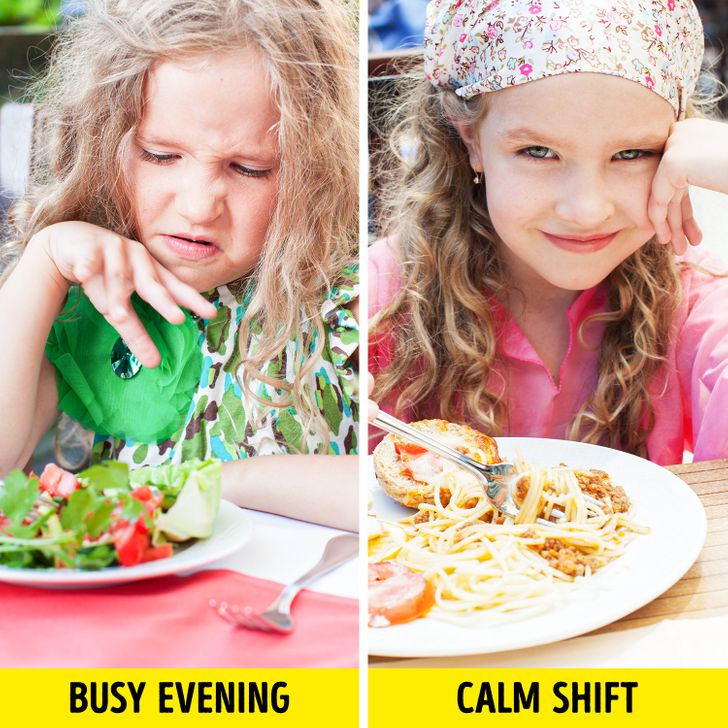
© TatyanaGl / depositphotos, © TatyanaGl / depositphotos
Don’t think that waiters don’t like children. The problem is that some guests don’t pay attention to their kids and it brings a lot of discomfort for everyone around. It’s not about the children themselves, but about their parents, who allow their offspring to misbehave and interfere with the work of the restaurant personnel.
Please control your kids. Sometimes, they may go into the kitchen or get in the way of a waiter who rarely watches under their feet, because they’re often in a hurry carrying something heavy or hot. We’ve already caught children in our kitchen, in our locker rooms, and in the restrooms for the staff. And one of my colleagues spilled coffee all over a kid when he accidentally ran into her from a corner while she was carrying a cup of coffee on a tray. We’re lucky that the child only got his shirt wet. © Kiwi / Pikabu
It’s difficult to serve customers with children. For some reason, they like to put baby carriers or high chairs in high-traffic places, like where the waiter needs to stand or where other customers need to pass. Servers sometimes only have one entry point to a table, and standing anywhere near a baby’s head with heavy dishes is scary. And you don’t want to let toddlers throw food around. I understand that they don’t do it on purpose, but it’s dangerous. It can turn the floor into a slip hazard for another customer or a waiter. © Heather Barnett / Quora
4. The customer addresses the waiter impolitely
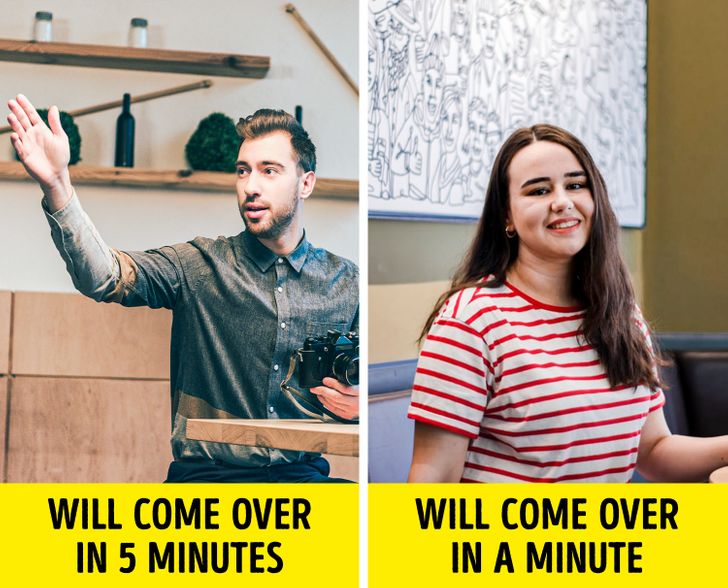
© VitalikRadko / depositphotos, © Sezer Arslan / unsplash
To make a waiter come to the table, many customers start waving their hands, snapping their fingers, and sometimes even trying to grab the waiter by their clothing and loudly call them by their name. And the staff is more likely to ignore or try to avoid these customers. According to the rules of etiquette, you need to catch the waiter’s glance and then nod to them.
In time, waiters start to control what they say and stay calm with picky guests, but sometimes we have to vent about these customers and let off steam, if not in the customers’ faces, at least we need to talk about some situations to our coworkers in the locker room. We do our job the best when the guests are polite. I’d never met so many ill-mannered people until I started working at a restaurant. I really started to appreciate sincere politeness after all of this. © whappend / Pikabu
We address you in a polite way and we expect you to do the same. And calling a waitress “Hey, girl,” “Honey,” or “Hey you” isn’t polite, actually. These guests often act very disrespectful and see staff as a lower class of people. We remember these guests and tell our colleagues about them so they won’t get the best of us. Your service will be fine, but you won’t become a favorite guest. And believe me, it’s very nice to be on the list of favorite guests. © Kiwi / Pikabu
5. What accessories the customer uses

© abi ismail / unsplash
Waiters don’t judge people by their clothes, because in the modern world, this is not a sign of a high income. But accessories still reveal the real status of their owner. People who can afford to have a comfortable life prefer expensive things, but don’t care too much about them.
I worked at a luxurious bar that was located in an elite apartment complex. We had different kinds of guests: well-off people who tipped well and lived in the building and ordinary people, who came to us from time to time and rarely left a tip. So we figured out how to spot well-off guests by their accessories. For example, if a guy tries to impress you with his iPhone, it’s not likely that you’ll get a good tip. But if a guest wears an expensive watch and has a Vertu in their pocket, we almost fought to serve their table.© BorisGivotnoe / Pikabu
A man was sitting at a table and looked like a construction worker. He was unshaven and looked tired. My colleague said to me:
— This guy won’t leave any tip. He’ll just sit there and then leave!
I was so ashamed of this attitude that I took the table. The man ordered sushi and tea that cost about $8 in total and asked for the bill. I brought him the receipt and then he gave me $70 and said to me:
— Thank you so much, I liked everything, Please, keep the change.
Then he just got up and left. Since then, I’ve never judged people by their clothing.© VodooSahka / Pikabu
6. What the customer orders
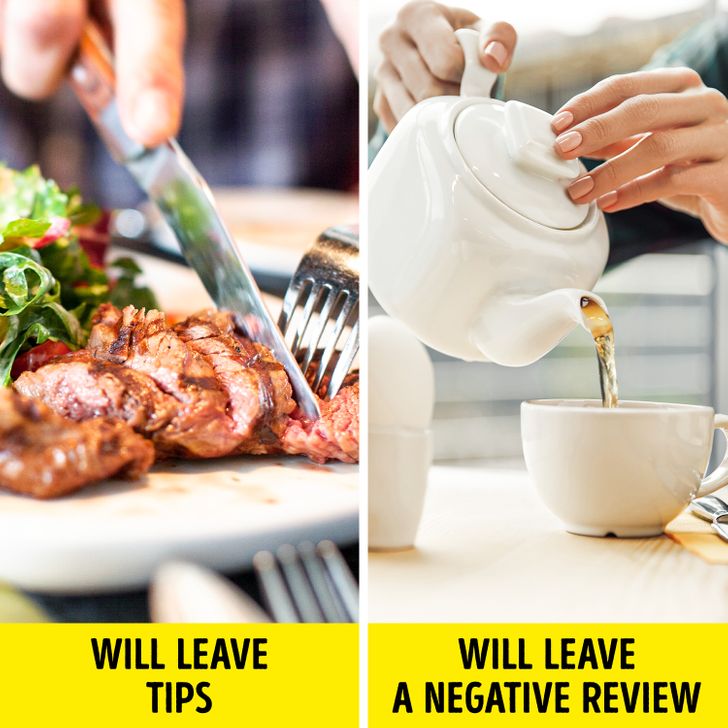
© Shebeko / depositphotos, © ViktoriiaDyachenko / depositphotos
Guests who order only tea will probably spend a lot of time at a restaurant without ordering anything else. And there are also other types of customers, like guests who order just a cup of coffee and spend hours drinking it or women who order one cocktail, while waiting for their Prince Charming to come all evening.
I worked as a waitress in a restaurant that served Japanese cuisine and noticed a certain pattern. If the guest orders the cheapest rolls and some tea, you won’t get a good tip. These customers might spend hours in the restaurant, but will only ask you to pour more hot water into a teapot and, in the end, will leave a negative review because you didn’t even do that quick enough. © Linxa / Pikabu
We had a lot of so-called business coaches in our cafe recently. 10-15 people would come into our cafe and order one teapot and sometimes a couple of business lunches. They spend 10 hours just sitting there and talking. They occupy 2 big tables and a couple of tables for 2 people, they make a lot of noise, and they ask us to pour more hot water into the teapot several times. © Tipichnyi officiant / vk
7. The customer doesn’t warn you about important things

© Vince Fleming / unsplash.
While it may seem like you’re making your waiter’s job more difficult with your special request, this is not true. It would be much worse if you were in a hurry when placing an order or suddenly remember that you haven’t eaten onions since you were 5, after the waiter brings your food.
I had a guy yell at me because there was a slice of tomato on his burger. He never specifically said he didn’t want tomato when he ordered. He wanted a full refund after my manager offered to give him a new one, which would take our cook about 3 minutes to prepare. He told us how we ruined his lunch and wasted all whole lunch break. © Hunny_Bunny20 / Reddit
A family came in and placed an order. After 10 minutes, the girl said to me that they were in a hurry and that if their dishes wouldn’t be ready in 5 minutes, they were leaving. I said nothing to them, but these people irritate me so much. Why is it so difficult to say in advance that you’re in a hurry? I’d just suggest for you the dishes that can be cooked quickly. Of course, we served the dishes on time. But they spent 15 more minutes just sitting there, even though they were “in a hurry.” © Tipichnyi officiant / vk
8. The customer asks for special treatment
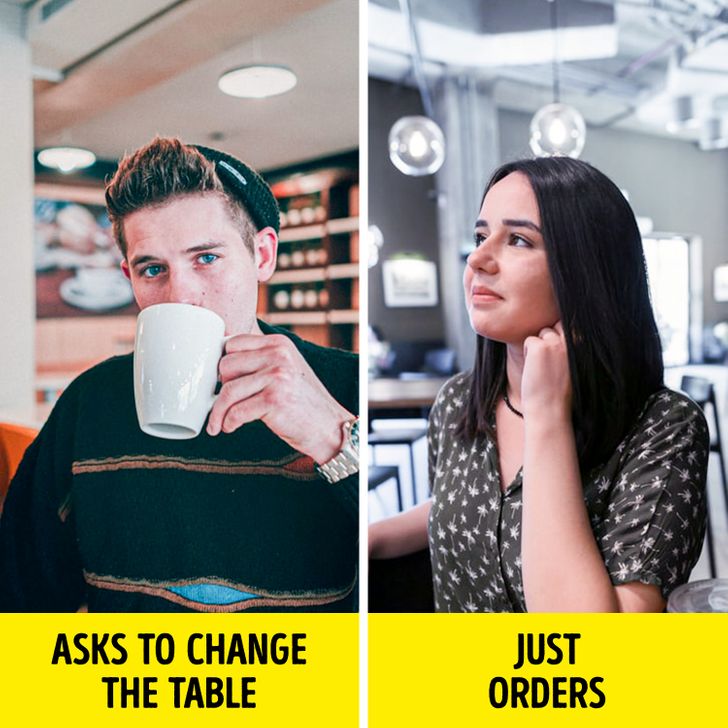
© sammy joonhee / unsplash, © Sezer Arslan / unsplash
If a guest tells you right away about how special they are, waiters are sure that they’ll be a problem.
If a group of friends comes in and someone starts to scream that they know our boss or chef, they’re just showing off in front of their friends and they won’t leave a good tip. I asked my colleagues numerous times about this and the answer was always the same. © KozaNoste1 / Twitter
I had a guy complaining that his wife was cold while they were sitting on the patio. I suggested moving inside, but the answer was no:
— We want to sit outside, but she’s cold. What are you going to do about that?
— Sir, I’m sorry I can’t do anything but offer to move you inside.
— Well, you’re wearing a sweater. Aren’t you even going to offer it to her?
So he asked to speak to my manager, who had to spend 10 minutes explaining that we have no control over the weather. © Pommesdor/ Quora
Once, I had a couple come in and as they were sitting down, before I had even introduced myself, the woman was already complaining that they had to wait for 5 minutes. Then she started telling me off by saying that the filet mignon she got was awful and cooked wrong. I suggested that she try something else. Nope, she went for the same thing again. When I brought her another dish, she grabbed her butter knife, slapped the top of the steak with its flat side 3 times, and said: “This is disgusting. I’m not even going to try it. Bring me a new one.” So I brought her a new one. She ate half of it and took the rest home. In the end, she wanted to talk to a manager, left me a comment card saying: “The steak was disgusting”, and gave one star for the service. © Mizerak / Quora
9. A customer orders food, but doesn’t eat it or takes pictures of it

© leungchopan / depositphotos, © IgorVetushko / depositphotos
This situation is a nightmare for any waiter because some dishes and drinks lose their best qualities if you don’t eat them right away. For example, fresh apple juice may turn dark and food may become cold. As a result, customers blame their waiter for all of this.
I worked in a restaurant that was popular in our town. We had French fries with a cheese and bacon topping on our menu. Once, a couple came in and the woman ordered this dish. I served it right away, as it was just cooked, but the problem is that potatoes quickly get wet under cheese. And the woman didn’t start to eat it until about 10 minutes later. As soon as she tried it, she got mad, claimed that I wanted to poison her, that the dish was cooked yesterday, and that it was cold. I’ve never heard anyone be so rude to me in my whole life. And the weirdest thing is that her husband was sitting right next to her the whole time, just laughing at the whole situation. © Alexandra Saviskaya / vk
